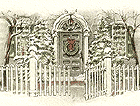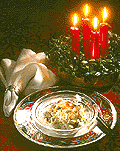 The history of Christmas dates back over 4000 years. Many of
our Christmas traditions were celebrated centuries before the Christ child
was born. The 12 days of Christmas, the bright fires, the yule log, the
giving of gifts, carnivals(parades) with floats, carolers who sing while
going from house to house, the holiday feasts, and the church processions
can all be traced back to the early Mesopotamians. The history of Christmas dates back over 4000 years. Many of
our Christmas traditions were celebrated centuries before the Christ child
was born. The 12 days of Christmas, the bright fires, the yule log, the
giving of gifts, carnivals(parades) with floats, carolers who sing while
going from house to house, the holiday feasts, and the church processions
can all be traced back to the early Mesopotamians.
Many of these traditions began with the Mesopotamian (美索不達米亞)
celebration of New Years. The Mesopotamians believed in many gods, and as
their chief god - Marduk (馬杜克,古代巴比倫人的主神,原為巴比倫的太陽神). Each year as winter
arrived it was believed that Marduk would do battle with the monsters of
chaos. To assist Marduk in his struggle the Mesopotamians held a festival
for the New Year. This was Zagmuk, the New Year's festival that lasted for
12 days.
The Mesopotamian king would return to the temple of Marduk and swear
his faithfulness to the god. The traditions called for the king to die at
the end of the year and to return with Marduk to battle at his side.
To spare their king, the Mesopotamians used the idea of a "mock" king.
A criminal was chosen and dressed in royal clothes. He was given all the
respect and privileges of a real king. At the end of the celebration the
"mock" king was stripped of the royal clothes and slain, sparing the life
of the real king.
 The Roman's celebrated their god Saturn. Their
festival was called Saturnalia which began the middle of December and
ended January 1st. With cries of "Jo Saturnalia!" the celebration would
include masquerades (化妝舞會) in the streets, big festive meals, visiting
friends and the exchange of good-luck gifts called Strenae (lucky fruits). The Roman's celebrated their god Saturn. Their
festival was called Saturnalia which began the middle of December and
ended January 1st. With cries of "Jo Saturnalia!" the celebration would
include masquerades (化妝舞會) in the streets, big festive meals, visiting
friends and the exchange of good-luck gifts called Strenae (lucky fruits).
"Jo Saturnalia!" was a fun and festive time for the Romans, but the
Christians though it an abomination (深惡痛絕) to honor the pagan (異教) god.
The early Christians wanted to keep the birthday of their Christ child a
solemn and religious holiday, not one of cheer and merriment as was the
pagan Saturnalia.
 But as Christianity spread they were alarmed by the
continuing celebration of pagan customs and Saturnalia among their
converts. At first the Church forbid this kind of celebration. But it was
to no avail (徒勞). Eventually it was decided that the celebration would be
tamed and made into a celebration fit for the Christian Son of God. But as Christianity spread they were alarmed by the
continuing celebration of pagan customs and Saturnalia among their
converts. At first the Church forbid this kind of celebration. But it was
to no avail (徒勞). Eventually it was decided that the celebration would be
tamed and made into a celebration fit for the Christian Son of God.
Some legends claim that the Christian "Christmas" celebration was
invented to compete against the pagan celebrations of December. The 25th
was not only sacred to the Romans but also the Persians whose religion
Mithraism (密特拉教�����,奉祀密特拉神的宗教����,紀元后最初3世紀內(nèi)傳至羅馬帝國) was one of Christianity's main
rivals at that time. The Church eventually was successful in taking the
merriment, lights, and gifts from the Saturanilia festival and bringing
them to the celebration of
Christmas. |